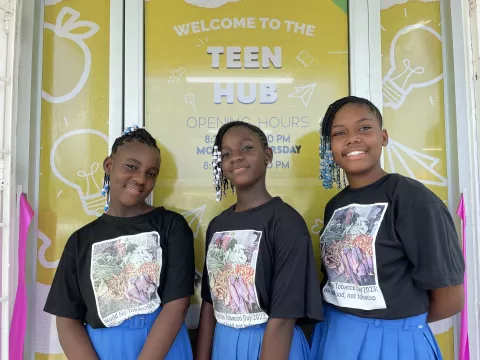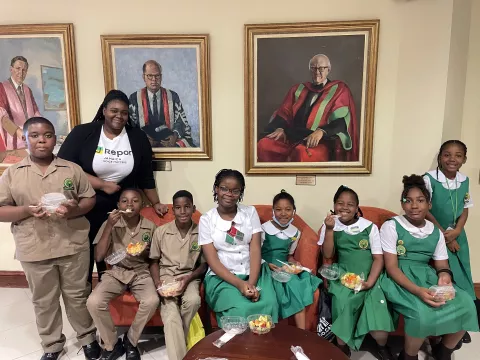When we invest in our children by pouring into them the societal values and attitudes that we want to be known for, then we will reap the benefits of a kinder, gentler community of productive and progressive youth.
One way to achieve this is through intervention programmes that recognize the potential of our children and young people to rise above their circumstances. The Ministry of Justice has found a remedy in the National Child Diversion Programme by giving youngsters a second chance.
This programme was developed with the assistance of UNICEF in 2020 to steer child offenders away from the criminal justice system. It caters to children 12 to 17 years old who are suspected of, or accused of committing an offence, for which a child may be referred under the Child Diversion Act. Operating in all fourteen (14) parishes through diversion centres, the programme is managed by competent diversion officers, some of whom are psychologists, social workers or otherwise specially trained to support child offenders.
Upon referral to the programme, either by the police or the court, a participant is assessed. The assessment may prove that the participant needs to be engaged through:
- Psycho-education therapy
- Drug abuse counselling
- Psychosexual therapy
- Mentorship
- Vocational training
A significant feature of the programme are the individual plans that are tailored to meet the needs of each participant. These plans are thoughtfully designed to ensure that the strengths of a participant are highlighted and nurtured; and the weaknesses are inhibited and discouraged. Most importantly, the programme includes the involvement of the parents and community in treatment plans. It is known that family and community involvement in youth rehabilitation is paramount. One reason is that it reassures them that there is a second chance. The child diversion officers ensure that the children they engage with, receive the care and protection required throughout the programme.
“The programme boasts a 98% success rate”, states Mr. Gary Gardner, Manager and Child Diversion Officer for the St. James Child Diversion Centre. This demonstrates the heart and passion with which diversion officers work, coupled with the commitment of the children and their parents as well as mentors.
This was evident in the story of Peter (not his real name). Members of the UNICEF team got the privilege to speak with Peter and his mother and to hear first-hand about his transformation.
Let’s look at the success story of Peter
Peter was sixteen (16) years old when he got entangled with the law and was referred to the child diversion programme.
Initially, he was not so sure about the programme. Peter shared that one of his responsibilities, while in the programme, was to never miss his weekly sessions with the counsellor. He was hesitant and even a little annoyed. He explains that like many Jamaicans, he believed that speaking with a counsellor meant that one was suffering from a mental illness. “Mi never waan fi speak to her because I am not mad”, Peter rationalized.
However, after a few sessions Peter says he benefitted tremendously from having someone to talk with about his issues and to guide and enhance his decision-making skills. From sticking to the weekly sessions, he has now successfully completed the programme.
Peter made good strides by completing his individualized plan. He is on a new path of self-development. At the age of eighteen (18), Peter is gainfully employed and is undergoing on-the-job training. He just wants to make his mother and himself proud.
“You can always count on Mr. Gardner. We need some more Mr. Gardners, that believe in the youth!”, Peter’s mom says happily. She believes wholeheartedly that Mr. Gardner and the programme saved her son. She accompanied him to all his sessions for more than a year.
Peter is proud of his journey to independence and self-actualization. He is grateful for a second chance. “I was able to get my TRN, birth certificate, NIS,” he says. He explains that without the diversion programme, he would not even think to get certain things in place for adulthood. Peter is so pleased and proud about this new chapter of his life. He and his mother highly recommend the programme, which is “creating a circle of care” within communities.
Peter’s story provides evidence that the journey from feeling trapped in a dead end, cornered by remorse, regret and fear to being placed on a new path of hope and a brighter future, is possible for other young people who have run afoul of the law and are given a second chance to recover and make an about turn.
What’s UNICEF doing?
UNICEF Jamaica is working with the National Child Diversion Programme in a multi-faceted way. UNICEF supports the training of clinical psychologists and diagnosticians, who assess participants who are referred to the diversion programme. UNICEF also ensures that evidence-based assessment tools were provided to facilitate these assessments.
We are also equipping the programme with an upgraded and digitized monitoring and evaluation system, which could inform next steps for tailored plans like the one that steered Peter on the right path.





